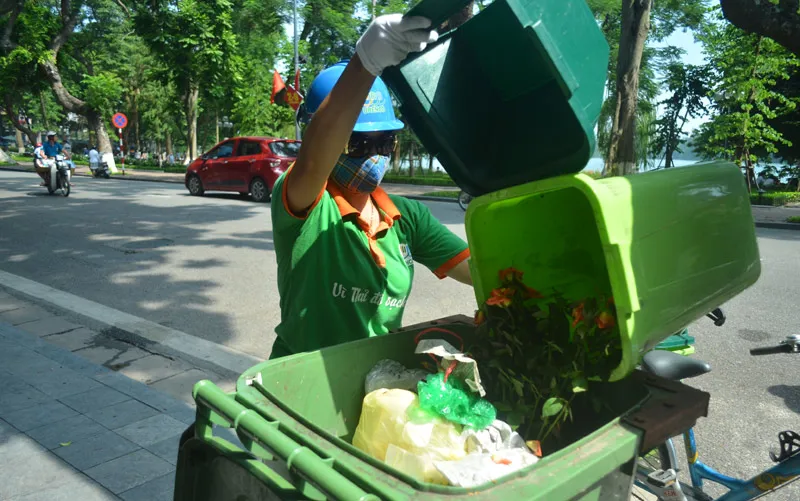Hanoi still struggles with household waste: Experts
Hanoi currently discharges around 6,000 tons of solid domestic waste daily, 89% of which are buried.
Hanoi’s first waste-to-energy plant construction is underway but its technology is already outdated and the city still struggles with domestic waste, according to experts.
On average, each Vietnamese releases almost one kIlogram of household waste per day. Half of the household garbage is buried but it is still unsanitary, causing environmental pollution.
Currently, there are five methods for treating household solid waste, including hygienic burial, burning, incineration of waste for power generation, low-temperature gasification, and plasma gasification.
Domestic waste collection on Trang Thi street. Photo: Pham Hung/Kinhtedothi.vn |
Mr. Nguyen Van Ve, deputy director of the Communication Committee of the Vietnam Homeland Front Committee, said that in order to improve the efficiency of household solid waste management, functional agencies should review and improve the regulatory system, strengthen and refine State management apparatuses on environmental protection and treatment of household solid waste.
In particular, it is necessary to amend the Law on Environmental Protection and its guiding documents to create consensus among State management agencies on environmental protection and domestic solid waste solution, Mr. Ve said.
Besides, the authorities need to promote to solid waste separation at source, improve waste collection, reusing and recycling.
The Vietnamese government should make appropriate policies to strongly encourage businesses to invest in domestic solid waste treatment systems, according to Mr. Ve.
Earlier, the Hanoi People's Committee issued a report on garbage treatment solutions in the city to soon complete the construction of a waste-to-energy plant on its outskirts.
Accordingly, the People's Committee of Soc Son district has been asked to complete site clearance by November 30 and thoroughly handle the remaining issues so that Thien Y Environment Energy Joint Stock Company will soon complete the construction of the waste-to-energy plant project, the largest one in Vietnam, in the district.
Thien Y Environment Energy Joint Stock Company, the project's contractor, is speeding up the works to put the plant into operation in February 2021.
Once in service, the plant will have a processing capacity of 4,000 tons of waste per day to help treat litter collected from urban districts. It is expected to reduce waste pollution that affects the lives of locals to below 5% instead from about 80% at present.
Hanoi currently discharges around 6,000 tons of solid domestic waste daily, 89% of which are buried.












